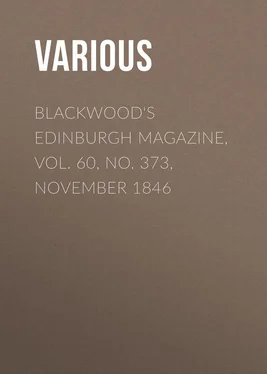Various - Blackwood's Edinburgh Magazine, Vol. 60, No. 373, November 1846
Здесь есть возможность читать онлайн «Various - Blackwood's Edinburgh Magazine, Vol. 60, No. 373, November 1846» — ознакомительный отрывок электронной книги совершенно бесплатно, а после прочтения отрывка купить полную версию. В некоторых случаях можно слушать аудио, скачать через торрент в формате fb2 и присутствует краткое содержание. Издательство: Иностранный паблик, Жанр: periodic, foreign_edu, Путешествия и география, на английском языке. Описание произведения, (предисловие) а так же отзывы посетителей доступны на портале библиотеки ЛибКат.
- Название:Blackwood's Edinburgh Magazine, Vol. 60, No. 373, November 1846
- Автор:
- Издательство:Иностранный паблик
- Жанр:
- Год:неизвестен
- ISBN:нет данных
- Рейтинг книги:5 / 5. Голосов: 1
-
Избранное:Добавить в избранное
- Отзывы:
-
Ваша оценка:
- 100
- 1
- 2
- 3
- 4
- 5
Blackwood's Edinburgh Magazine, Vol. 60, No. 373, November 1846: краткое содержание, описание и аннотация
Предлагаем к чтению аннотацию, описание, краткое содержание или предисловие (зависит от того, что написал сам автор книги «Blackwood's Edinburgh Magazine, Vol. 60, No. 373, November 1846»). Если вы не нашли необходимую информацию о книге — напишите в комментариях, мы постараемся отыскать её.
Blackwood's Edinburgh Magazine, Vol. 60, No. 373, November 1846 — читать онлайн ознакомительный отрывок
Ниже представлен текст книги, разбитый по страницам. Система сохранения места последней прочитанной страницы, позволяет с удобством читать онлайн бесплатно книгу «Blackwood's Edinburgh Magazine, Vol. 60, No. 373, November 1846», без необходимости каждый раз заново искать на чём Вы остановились. Поставьте закладку, и сможете в любой момент перейти на страницу, на которой закончили чтение.
Интервал:
Закладка:
Parliament met on the 25th November; and Marlborough, in the end of the year, returned to London. But he soon received decisive proof of the altered temper both of government and the country towards him. In the Queen's speech, no notice was taken of the late successes in Flanders, no vote of thanks for his services in the campaign moved by ministers; and they even contrived, by a sidewind, to get quit of one proposed, to their no small embarrassment, by Lord Scarborough. The Duchess, too, was threatened with removal from her situation at court; and Marlborough avowed that he knew the Queen was "as desirous for her removal as Mr Harley and Mr Masham can be." The violent temper and proud unbending spirit of the Duchess were ill calculated to heal such a breach, which, in the course of the winter, became so wide, that her removal from the situation she held, as mistress of the robes, was only prevented by the fear that, in the vehemence of her resentment, she might publish the Queen's correspondence, and that the Duke, whose military services could not yet be spared, might resign his command. Libels against both the Duke and the Duchess daily appeared, and passed entirely unpunished, though the freedom of the press was far from being established. Three officers were dismissed from the army for drinking his health. When he waited on the Queen, on his arrival in England, in the end of December, she said – "I must request you will not suffer any vote of thanks to you to be moved in Parliament this year, as my ministers will certainly oppose it ." Such was the return made by government to the hero who had raised the power and glory of England to an unprecedented pitch, and in that very campaign had cut deeper into the iron frontier of France than had ever been done in any former one. 24 24 Coxe, iv. 405.
The female coterie who aided at St James's the male opponents of Marlborough, were naturally extremely solicitous to get the Duchess removed from her situations as head of the Queen's household and keeper of the privy purse; and ministers were only prevented from carrying their wishes into effect by their apprehension, if executed, of the Duke's resigning his command of the army. In an audience, on 17th January 1711, Marlborough presented a letter to her Majesty from the Duchess, couched in terms of extreme humility, in which she declared that his anxiety was such, at the requital his services had received, that she apprehended he would not live six months. 25 25 "Though I never thought of troubling your Majesty again in this manner, yet the circumstances I see my Lord Marlborough in, and the apprehension I have that he cannot live six months, if there is not some end put to his sufferings on my account, make it impossible for me to resist doing every thing in my power to ease him." Duchess of Marlborough to Queen Anne , 17th Jan. 1711. Coxe, iv. 410.
The Queen at first refused to read it; and when at length, at the Duke's earnest request, she agreed to do so, she coldly observed – "I cannot change my resolution." Marlborough, in the most moving terms, and with touching eloquence, intreated the Queen not to dismiss the Duchess till she had no more need of her services, by the war being finished, which, he hoped, would be in less than a year; but he received no other answer, but a peremptory demand for the surrender of the gold key, the symbol of her office, within three days. Unable to obtain any relaxation in his sovereign's resolution, Marlborough withdrew with the deepest emotions of indignation and sorrow. The Duchess, in a worthy spirit, immediately took his resolution; she sent in her resignation, with the gold key, that very night. So deeply was Marlborough hurt at this extraordinary ingratitude for all his services, that he at first resolved to resign his whole command, and retire altogether into private life. From this intention he was only diverted, and that with great difficulty, by the efforts of Godolphin and the Whigs at home, and Prince Eugene and the Pensionary Heinsius abroad, who earnestly besought him not to abandon the command, as that would at once dissolve the grand alliance, and ruin the common cause. We can sympathise with the feelings of a victorious warrior who felt reluctant to forego, by one hasty step, the fruit of nine years of victories: we cannot but respect the self-sacrifice of the patriot who preferred enduring mortifications himself, to endangering the great cause of religious freedom and European independence. Influenced by these considerations, Marlborough withheld his intended resignation. The Duchess of Somerset was made mistress of the robes, and Mrs Masham obtained the confidential situation of keeper of the privy purse. Malignity, now sure of impunity, heaped up invectives on the falling hero. His integrity was calumniated, his courage even questioned, and the most consummate general of that, or perhaps any other age, represented as the lowest of mankind. 26 26 Smollett, c. x. § 20.
It soon appeared how unfounded had been the aspersions cast upon the Duchess, as well as the Duke, for their conduct in office. Her accounts, after being rigidly scrutinised, were returned to her without any objection being stated against them; and Marlborough, anxious to quit that scene of ingratitude and intrigue for the real theatre of his glory, soon after set out for the army in Flanders. 27 27 Marlborough to the Duchess, 24th May 1711. Coxe, v. 417-431.
Marlborough arrived at the Hague on the 4th March; and, although no longer possessing the confidence of government, or intrusted with any control over diplomatic measures, he immediately set himself with the utmost vigour to prepare for military operations. Great efforts had been made by both parties, during the winter, for the resumption of hostilities, on even a more extended scale than in any preceding campaign. Marlborough found the army in the Low Countries extremely efficient and powerful; diversions were promised on the side both of Spain and Piedmont; and a treaty had been concluded with the Spanish malcontents, in consequence of which a large part of the Imperial forces were rendered disposable, which Prince Eugene was preparing to lead into the Low Countries. But, in the midst of these flattering prospects, an event occurred which suddenly deranged then all, postponed for above a month the opening of the campaign, and, in its final result, changed the fate of Europe. This was the death of the Emperor Joseph, of the smallpox, which happened at Vienna on the 16th April – an event which was immediately followed by Charles, King of Spain, declaring himself a candidate for the Imperial throne. As his pretensions required to be supported by a powerful demonstration of troops, the march of a large part of Eugene's men to the Netherlands was immediately stopped, and that prince himself was hastily recalled from Mentz, to take the command of the empire at Ratisbon, as marshal. Charles was soon after elected Emperor. Thus Marlborough was left to commence the campaign alone, which was the more to be regretted, as the preparations of Louis, during the winter, for the defence of his dominions had been made on the most extensive scale, and Marshal Villars' lines had come to be regarded as the ne plus ultra of field fortification. Yet were Marlborough's forces most formidable; for, when reviewed at Orchies on the 30th April, between Lille and Douay, they were found, including Eugene's troops which had come up, to amount to one hundred and eighty-four battalions, and three hundred and sixty-four squadrons, mustering above one hundred thousand combatants. 28 28 Eugene to Marlborough, 23d April 1710; Marlborough to St John, 29th April 1710. Coxe, vi. 16. Disp. v. 319.
But forty-one battalions and forty squadrons were in garrison, which reduced the effective force in the field to eighty thousand men.
Интервал:
Закладка:
Похожие книги на «Blackwood's Edinburgh Magazine, Vol. 60, No. 373, November 1846»
Представляем Вашему вниманию похожие книги на «Blackwood's Edinburgh Magazine, Vol. 60, No. 373, November 1846» списком для выбора. Мы отобрали схожую по названию и смыслу литературу в надежде предоставить читателям больше вариантов отыскать новые, интересные, ещё непрочитанные произведения.
Обсуждение, отзывы о книге «Blackwood's Edinburgh Magazine, Vol. 60, No. 373, November 1846» и просто собственные мнения читателей. Оставьте ваши комментарии, напишите, что Вы думаете о произведении, его смысле или главных героях. Укажите что конкретно понравилось, а что нет, и почему Вы так считаете.












